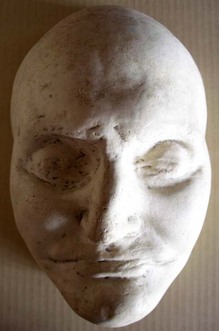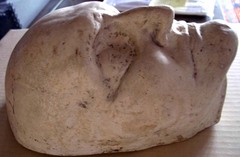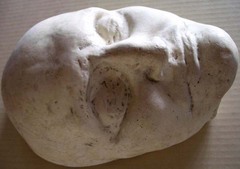Author, essayist, and critic, Laurence Hutton (1843-1904) was a collector of death masks, which he donated to Princeton University. Although he had many stories about the collection, he was only completely sure of the provenance and authenticity of a handful. One of these was the mask of Aaron Burr, Class of 1772 (1756-1836).
A 1901 article in the New York Times entitled “Laurence Hutton’s Mask of Aaron Burr” provides the details. An unidentified author writes, “An elderly gentleman called to inspect what was familiarly called “The Skullery” in Mr. Hutton’s New York house, and particularly to make a study of the mask of Henry Clay … [whose authenticity] was doubtful.” After some time, the sculptor “was inclined to accept the authenticity of Clay. And he knew that Burr was Burr—for he had made it himself! He had not seen it for fifty years … but recognized it at a glance. As a young man employed in the construction of “specimens” for a firm of phrenologists, he had been sent to Staten Island the day after Burr died. And then and there he had performed the gruesome operation.”
In his book Portrait in Plaster, Hutton wrote that the mask was “made by an agent of Messrs. Fowler & Wells, who still posses the original cast. The features are shortened in a marked degree by the absence of the teeth. Mr. Fowler said that in Burr destructiveness, combativeness, firmness, and self-esteem were large and amativeness excessive.”
Aaron Burr was born in Newark, New Jersey, on February 6, 1756, son of Aaron Burr, a theologian and second president of the College of New Jersey (now Princeton University). He entered the College of New Jersey at age thirteen and graduated in 1772. Burr began his political career in 1784 and continued in politics … ultimately as Vice President of the United States under Jefferson. He lost his second candidacy for Vice President when he alienated Republican leadership with sympathies for the Federalists. Burr blamed much of his political downfall on Alexander Hamilton and his compatriots. After failing to force Hamilton to apologize for statements made against Burr in the gubernatorial race, Burr challenged Hamilton to a duel. When Burr killed the prominent politician, popular opinion cast him as a cold-blooded murderer, and warrants were put out for his arrest in New York and New Jersey. Burr fled to Philadelphia and then the South to escape capture. (taken from Princeton University Burr collection finding aid)


